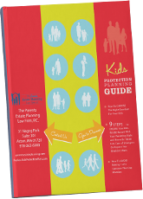
When people think about how to prepare for their death, their first thought is often to create a Will. While having a Will is enough for some people, having just a Will is often not sufficient enough to accomplish the goals that you may have for the future of your family. Understanding the things that a Will cannot do for you and your family will help you understand your options and what kind of estate plan is right for you and your family.
Here are the 5 things that a Will can’t do:
1. Keep Your Family Out of Probate
If you pass away with only a Will and you own your assets in your own name, your estate will have to pass through a cumbersome probate court administration. This means your loved ones will have to endure a time consuming, and often expensive, probate experience. Additionally, since probate court filings are a public matter, your estate will now be open and available for public inspection. Using other estate planning vehicles (such as a trust) will allow you to keep most, or even all, of your estate out of probate.
2. Effectively Provide for a Child Who Has Special Needs
If you have a child who needs special care, you want to set aside assets to help provide for that care. Leaving money directly to a child through your Will may not be advisable, either because they cannot manage their own money, or, more importantly, because leaving the money through your Will may jeopardize their eligibility for government benefits. Using a special needs trust, however, will allow you to set the money aside specifically to provide for the needs of your child, while still maintaining their benefits eligibility.
3. Provide Effective Tax Minimization
If you have enough assets (in Massachusetts, as little as $1 million, including the face value of life insurance) they may be subject to estate taxes upon your death. Whether it is the state or federal estate tax (or both) that applies, those taxes can add up to tens or even hundreds of thousands of dollars. A Will is not flexible enough to effectively minimize (or even eliminate) those taxes. A trust is the preferred vehicle to deal with estate taxes.
4. Use Assets for Specific Charitable Tasks
While you can leave your assets to a charity via a Will, you can’t do much to direct that charity when it comes to how they will use the money. If you’d like your money to be used in a specific way or for a specific cause, a Will is not sufficient. Instead, you’ll want to use a charitable trust that will allow you to detail exactly how the money should be used to benefit your preferred charity.
5. Transfer Certain Assets
Transferring certain assets from yourself to a beneficiary can be a complex legal process. For example, if you want to transfer firearms, there are quite a few legal steps that would need to happen. If you place these assets in a trust, however, the entire experience is much easier and you can avoid a lot of legal complications.
Comprehensive Estate Planning
Having a Will is an important first step in most estate plans, but it is not the end of the process. If you want a comprehensive estate plan, we are here for you. Contact us to discuss your specific needs today.












